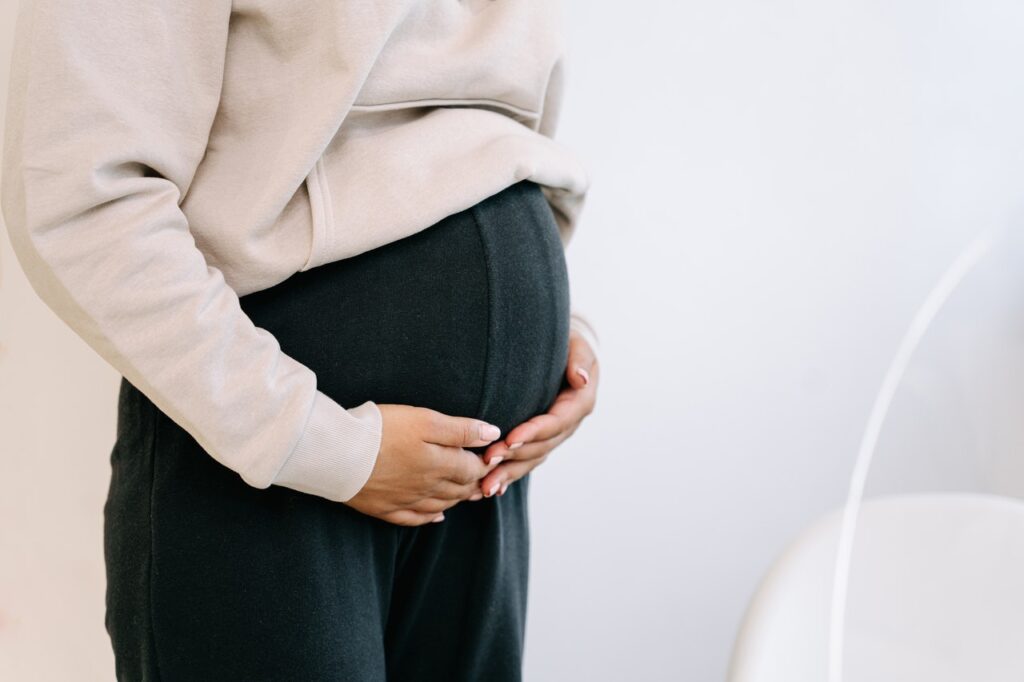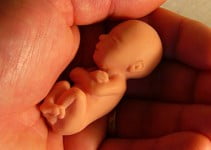
Maintaining optimal body weight is essential and challenging for many women. However, pregnancy may further increase the tummy size. Increased belly size is more likely due to hormonal changes and water retention in early pregnancy, as the fetus has not formed yet.
However, the fetus starts growing from the second trimester onwards, and the tummy starts taking a typical shape characteristic of pregnancy.
Almost all women have some favorite clothing, dresses, jeans, which they love to wear more frequently. Although there are many clothes available for pregnant women, one wouldn’t buy many in the early pregnancy. Thus, one might be tempted to suck in the stomach, to wear favorite clothes.
So, can you suck in your stomach when pregnant? The answer is a big NO.
It can be done in theory, as there are no studies regarding its risk, but it should be avoided.
It is natural to ask, what is the risk if someone sucks in the stomach in early pregnancy. What could be the risk when a person has learned about the pregnancy just a few weeks back? Moreover, it is understood that fetal size is small.
In fact, there is not even a fetus, just an embryo—an embryo that is barely the size of a walnut. Fetus forms only after the 11th week when most organs have developed.
It is wrong to assume that there is no risk in wearing tight clothes, trying to suck in the belly when there is just an embryo, as the uterus is still not dilated much and close to the size of non-pregnant women. After all, the uterus starts considerably increasing after 12 weeks or from the early second trimester.
Here are the reasons why one should never suck in the tummy even in the earliest stages of pregnancy:
 80% of miscarriages occur in the first trimester– yes, the vast majority of miscarriages happen in the early stages of pregnancy. It is estimated that about 8-15% of all pregnancies end up with a miscarriage. Thus, the first trimester is indeed a time of high risk.
80% of miscarriages occur in the first trimester– yes, the vast majority of miscarriages happen in the early stages of pregnancy. It is estimated that about 8-15% of all pregnancies end up with a miscarriage. Thus, the first trimester is indeed a time of high risk.
It is a time when women should pay utmost attention to certain things. Like, avoid lifting heavyweight, having adequate rest, keeping hydrated, avoiding jerky movements. It is a time to think about prenatal care [1].
However, many women may not feel any difference during these early days. In addition, pregnancy toxicity does not occur in all cases. Thus, it is not surprising that many are tempted to suck in their tummy even after knowing that they are pregnant.
One should also try to pay attention to the causes of early pregnancy loss like alcohol use, caffeine, substance abuse, chronic disorders, infections, use of certain medications, and even obesity. However, exercise does not increase the risk of pregnancy loss.
Sucking in the tummy differs in the way that it causes prolonged and unusual pressure on the belly and uterus. Moreover, obesity is one of the risk factors for pregnancy loss. However, it is worth understanding that there are no clinical studies regarding the risk caused by additional pressure on the tummy. It means that the risk of trying to suck in the stomach is minimal, but theoretically, there is still a risk.
Another severe issue in the western world is the rising mean age of mothers. It is now above 26 years of age in the US. It is almost 30 in some ethnic groups.
It means that many are getting pregnant after thirty years of age. Pregnancies in the forties are not uncommon. However, the risk of pregnancy loss increases considerably with age and reaches above 50% in those older than 40 years [2,3].
Again, trying to suck in would not pose any significant risk for pregnancy. However, even the minutest of awkward actions must be avoided during the first trimester.
Interestingly enough, some studies suggest that nausea in early pregnancy is a good sign as nausea is associated with a reduced risk to the pregnancy. Similarly urge to have sex in the early pregnancy is a positive sign.
It might be explained based on the hormonal changes in the body. Stark hormonal changes are more likely to cause nausea and other early symptoms of pregnancy [4].
It means that the absence of nausea or not feeling pregnant are rather negative signs. The lack of these signs may wrongly make some women think that it is ok to suck in the belly. Whereas, on the contrary, such women should be paying greater attention.
Similarly, one should not suck in the belly in the second or third trimester. At this stage, things are different. The fetus has formed, and the uterus starts increasing in size faster. However, it is vital to understand that a larger belly size is due to fetus and amniotic fluid in pregnancy. Pressurizing amniotic fluid will put unjust pressure on the uterus and the fetus.
It appears that one can reduce the risk through a healthy lifestyle. Thus, intake of vitamins, higher consumption of fruits and vegetables may help reduce the risk. In addition, maintaining a healthy weight is good for those planning to get pregnant. However, once pregnant, one should start taking precautions.
Considering that many pregnant women would be above the age of 30, have a job, living with overweight, and frequently consume coffee, there is a considerable risk to pregnancy in its early days. Some risk factors are well known to science; however, others have not been studied.
Although there is no understanding about how much risk can sucking in a tummy in early pregnancy poses. Still, the general advice is that avoid doing anything that might pose the minutest risk. Remember that the first trimester is a high risk for miscarriage. Moreover, in most cases, there would be other existing risk factors.
References
- Prine L, MacNaughton H. Office Management of Early Pregnancy Loss. AFP. 2011;84(1):75-82.
- Products – Data Briefs – Number 232 – January 2016. Published June 8, 2019. Accessed December 18, 2021. https://www.cdc.gov/nchs/products/databriefs/db232.htm
- Andersen AMN, Wohlfahrt J, Christens P, Olsen J, Melbye M. Maternal age and fetal loss: population based register linkage study. BMJ. 2000;320(7251):1708-1712.
- Maconochie N, Doyle P, Prior S, Simmons R. Risk factors for first trimester miscarriage—results from a UK-population-based case–control study. BJOG: An International Journal of Obstetrics & Gynaecology. 2007;114(2):170-186. doi:10.1111/j.1471-0528.2006.01193.x




 Dr. Preet Pal SB is a physician (M.D. Medicine) with a specialization in diabetes (Fellowship in diabetes, Royal Liverpool Academy). He has a particular interest in metabolic disorders, considering that they are rising in every corner of the world, more so in India.
Dr. Preet Pal SB is a physician (M.D. Medicine) with a specialization in diabetes (Fellowship in diabetes, Royal Liverpool Academy). He has a particular interest in metabolic disorders, considering that they are rising in every corner of the world, more so in India.